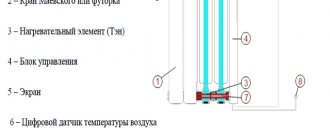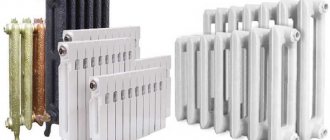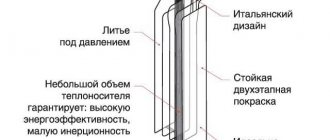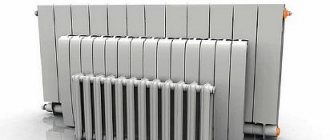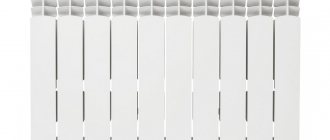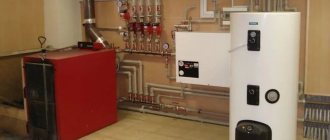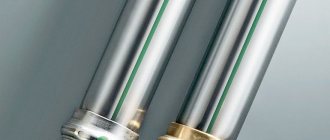Since time immemorial, simple water has been used as a coolant in heating systems. The specific heat capacity of water reaches 4.168 kJ/kg, which is very good. In addition, the price of this coolant is low. But the water poured into the radiator has one significant drawback, in particular, freezing in winter when the boiler is turned off.
This nuisance is well known to owners of country cottages and dachas, where people live irregularly. If you turn off the autonomous system for a couple of days in the winter and do not drain the water, you may believe that the pipes or batteries will fail. Damage to heating devices will occur due to the expansion of water when freezing, and as a result, the batteries may simply burst.
The real solution in this situation is antifreeze for aluminum radiators. There is a wide list of these liquids on the market, and therefore it is possible to select products for both the ubiquitous aluminum and bimetal, steel and cast iron. If you are thirsty, you can buy universal products that can be poured into any system without compromising the efficiency of its operation.
Fundamentally important: The main requirements that must be taken into account when choosing antifreeze are fire safety and the absence of toxic additives that can enter the room along with fumes.
General information about non-freezing coolants
Antifreeze for autonomous heating systems is produced on the basis of an aqueous solution of ethylene glycol or on the basis of an aqueous solution of propylene glycol.
In addition to the listed ingredients, a certain amount of additives is added to the solutions. This is done in order to eliminate the possibility of foaming of the coolant in the system and to prevent corrosion processes in heating devices.
Moreover, due to the introduction of special additives, antifreezes do not have a destructive effect on rubber and polymer seals, which are used in large quantities in the construction of heating systems.
Currently, the domestic market offers a wide selection of coolants, which are distinguished by the manufacturer’s brand, the ability to work in certain systems and, of course, the price. Products from such brands as Energos Lux, Energos Universal, Thermagent and Dixis have gained widespread popularity.
Let us immediately remind you that the price of compositions of Russian and foreign production differs significantly. The question arises: why could tools designed to perform the same tasks cost more or less?
The bulk of Russian products are made on the basis of ethylene glycol.
In most cases, these are tools implemented in two versions:
- modifications designed for temperatures up to – 30 °C;
- modifications designed for temperatures up to – 65 °C.
The use of ethylene glycol allows the manufacturer to reduce the cost of the finished product. But when choosing an inexpensive coolant made using ethylene glycol, you need to understand that it is toxic.
For example, a lethal dose of ethylene glycol forms 100 ml. In other words, when the system depressurizes, in the event of a rupture of connections, a leak is likely, which is associated with a danger to human health. To promptly detect leaks, ethylene glycol antifreeze is usually colored red.
Specifics of using antifreeze with various types of heating radiators
Is it possible to use ethylene glycol-based antifreeze for aluminum radiators and analogues made of other metals?
Fundamentally important: The compatibility parameters of the coolant and heating devices are indicated by the manufacturer on the canister. Before purchasing, take the trouble to read the instructions and the compatibility parameters of the product and the heating devices used.
Different types of heating devices react differently to the use of antifreeze.
So is it necessary or not?
Antifreeze for heating. a multicomponent mixture including water, base fluid, and improving additives. Actually, the word “antifreeze” comes from the English “anti” (translated as “against”) and “freeze” (translated as “freeze”). That is, it prevents freezing. In relation to the heating system. “defrosting”.
One of the main components. water. The base fluid can be:
- ethylene glycol
- propylene glycol
- glycerol
- natural substances (sodium chloride hexahydrate)
- other
They provide antifreeze with a low freezing point. For concentrates it is about 65-70 ℃. Ready-to-fill coolants are available with frost resistance of 10-35 ℃. The main performance characteristics of antifreeze depend on the ratio of water and glycol (glycerin, etc.). freezing temperature. More water and less base fluid. freezing temperature is higher. The amount of glycol increases. the freezing temperature decreases. For example, with the ratio water. ethylene glycol 33:67 freezing point about.75℃, 65:35. about.20℃.
Despite the increase in the share of plastic in heating systems, it will not be possible to get away from aluminum, copper, and steel. Heat exchangers, circulation pumps, boilers, radiators are made from such materials. To prevent corrosion, additives are added to antifreezes. For example, sodium phosphate.
antifreeze to the heating system ? Not always. The UkrBishofit company conducted a survey of consumers and identified 4 cases when it is impossible to do without an antifreeze:
- Preservation of the house while maintaining the functionality of the heating system;
- Protection against defrosting during periodic residence;
- Protection of an expensive heat exchanger from scale and deposits;
- Protection of the heating system during emergency shutdowns.
This is an almost exhaustive list of when you need to add anti-freeze. Naturally, sellers will find for you a hundred or two more advantages of non-freezing coolants. And they will remain silent about the shortcomings. And there are some.
Flaws
- unlike water, it costs money
- high viscosity. adjustments are required for the power of circulation pumps
- needs replacement approximately every five to eight years
That is, by spending money on non-freezing coolant, you acquire guaranteed protection against defrosting. Boilers, pumps, radiators. expensive equipment. It's worth it.
It is important to note that the use of antifreeze must be permitted by the equipment manufacturer. Before purchasing an anti-freeze device, you should carefully study the instructions and, if necessary, consult the manufacturer.
Glycerin antifreeze for heating systems
Glycerin is one of the universal elements. What they don't do:
- lubricate the rubber seals;
- process fishing line for winter fishing;
- used in cosmetology;
- restore skin;
- even the floors are washed.
In general, it is a miracle remedy that can even be taken orally. It has lubricating properties and does not freeze. Glycerin antifreeze has been used for heating systems since the mid-20th century. You cannot take glycerin from a pharmacy, dilute it with water and use it as a coolant. Everything is more complicated, because it is necessary to prevent such an undesirable phenomenon as strong formation of foam, which leads to airing of the circuit, and so on.
The price is in the middle of the two compositions described above, and the service life is twice as long and is 10 years. A very useful quality of glycerin glycol is its ability to restore rubber, unlike propylene glycol and ethylene glycol, which dry it. The disadvantages include the largest weight of the composition among all those considered and the lowest thermal conductivity coefficient.
Read what a heating filter is and how it works.
READ Do-it-yourself air-heated fireplace
You can read about the design of the heating system sump at //utepleniedoma.com/otoplenie/otopitelnoe-oborudovanie/vidy-filtrov-otopleniya
Advantages of radiators with antifreeze
If you fulfill all the above requirements, then:
- A radiator with antifreeze will last 10 years or more.
- It is environmentally friendly and harmless to human health.
- A huge selection of aluminum radiators suitable for filling with antifreeze.
- High-quality antifreeze from the manufacturer (well-known brands), in a large assortment.
- Indispensable in schools, hospitals and residential premises in case of a sudden power outage or gas supply.
Selection of radiators
Difficulties in choosing a battery for water heating do not arise without reason. Sometimes an uninitiated user may purchase batteries that will not be effective or will not be suitable for his system at all. In general, it's best to turn to the experts, but here are some tips that might point you in the right direction.
If you live in an apartment in a multi-storey building, then bimetallic radiators will be your best choice.
They are not afraid of pressure surges. If you live in a private house, here you control parameters such as the water temperature in the heating radiators and pressure, and also independently select the liner material. This is why aluminum batteries are the right choice for you. If beauty is not important to you in some rooms, then you can install homemade registers.
It is important to note such a criterion as thermal power. The need must be calculated using the following formula: 40 W of heat per 1 cubic meter of volume. But this value is only basic; it is modified by coefficients:
- In the Southern regions, the total power is multiplied by 0.7-0.9.
- In the North - by 1.3-2.0.
- If the apartment is corner at the end of the house - 1.2-1.3 depending on the thickness and material of the walls.
- Private house - multiply the base value by 1.5.
- Each window adds 100 watts of power.
- Each door leading to the street is 200 watts.
So, on average, the capacity of a heating radiator will be:
- Aluminum radiator section – 0.45 l of coolant;
- New or old battery section made of cast iron – 1/1.75 l;
- Linear meter of 15 mm/32 mm pipe – 0.177/0.8 l.
How much water is in the heating radiator will also depend on the presence of expansion tanks and feed pumps. In this case, to determine the total volume of the entire heating system, you should add up the volume of the heating battery - each radiator, boiler, pipeline.
It should be separately noted the expansion coefficient of the liquid, which will affect how many liters are in the heating radiator. This indicator can have two values, and it affects the volume of heating radiators. If water is used, then it is 4%. If heating radiators are used for antifreeze, which is based on ethylene glycol, then the coefficient will be 4.4%.
Conclusion
Now, at a time when we know how aluminum radiators and antifreeze get along, it is possible to decide whether it is worth using antifreeze liquids to operate autonomous heating or not. For more information, we recommend watching the video in this article.
At dachas, radiators are more relevant, since many country houses are located far from gas sources or a boiler room.
All radiators are divided into water (they heat the room using heated water) and air (using various means of heating - liquid and solid, from electricity).
There are pros and cons to any heating system . So, for example, if you decide to heat your dacha using electric heaters, then your electricity bill will not make you happy at all. A stove heater is often used in the country. But to do this, you need to stock up on the required amount of firewood or coal and store it all somewhere else. The best option for heating a dacha is aluminum radiators with antifreeze.
Who needs antifreeze for their home heating system? How to select and fill?
Most private home owners. houses, cottages, dachas. water, as a coolant for the heating system, is completely satisfactory. Most, but not all. Some people use their housing periodically and when sub-zero temperatures occur they are forced to drain the water from the system. Others, especially in rural, remote regions, are at risk of having their electricity and gas cut off. And this, again, can lead to defrosting if the system is not drained in time or the house is not heated with a stove. There is a relatively inexpensive solution to fix these problems. antifreeze for home heating systems. It is often also called “anti-freeze liquid”.
Freezing point
When choosing, you need to consider what the minimum temperatures are in your region. The most popular option are liquids with a freezing point of 30-35℃. These are suitable for the north, east, and west of Ukraine. For southern regions, you can purchase antifreeze with a lower freezing point.
Which radiator to choose
For a private home, metal radiators are chosen. The most popular types of metal for radiators are cast iron (in many old apartments), steel, bimetal, and aluminum.
- Cast iron batteries consist of sections, they are very strong and durable. But the appearance and design are outdated, and they are very heavy to move and mount.
- Steel radiators are more beautiful and lighter. They can be either panel or tubular. The downside is its fragility and greater susceptibility to corrosion.
- Aluminum batteries are light, beautiful, and convenient for the garden. But they are very selective in the composition of the liquid that is heated in them. It is necessary to approach the choice of antifreeze with special attention.
- Bimetallic radiators are made of an alloy of aluminum and steel and are the most successful solution in your home. Only the price is high compared to aluminum radiators.
If antifreeze is a heat carrier
If you decide to use ethylene glycol-based antifreeze as a liquid heated in the radiator, then you need to choose radiators of higher power. After all, antifreeze has a higher viscosity than water, therefore, more powerful pumps and units are needed to move antifreeze through pipes. Thanks to the density of antifreeze, heat will be firmly maintained in the country house.
Aluminum's susceptibility to corrosion should also concern cottage owners. But antifreeze already contains anti-corrosion elements that will help keep your radiators functioning for a long time.
What to consider
The heating system of a dacha uses many elements, connections, valves, and adapters. It must be taken into account that ethylene glycol-based antifreeze is a more viscous, viscous substance than water, and all connections and adapters must be more tight and thorough.
Antifreeze can heat up to 170 degrees. In this case, it begins to decompose, which will negatively affect the entire autonomous heating system of the dacha. To do this, the system must provide constant, continuous circulation of antifreeze. If used correctly, antifreeze will last 10 seasons, then it should be replaced.
Fill correctly
In order for antifreeze to circulate properly in the system, it is necessary to have a reservoir - an expansion barrel for the free flow of the ethylene glycol-based solution. It will also be a place for filling and draining coolant.
If you need to add antifreeze, you need to fill in exactly the same solution, of the same brand . Otherwise, sediment will appear, which will have a detrimental effect on the entire heating system. If your jar says “concentrate”, then you need to dilute it in the same concentration - 1 to 3.


